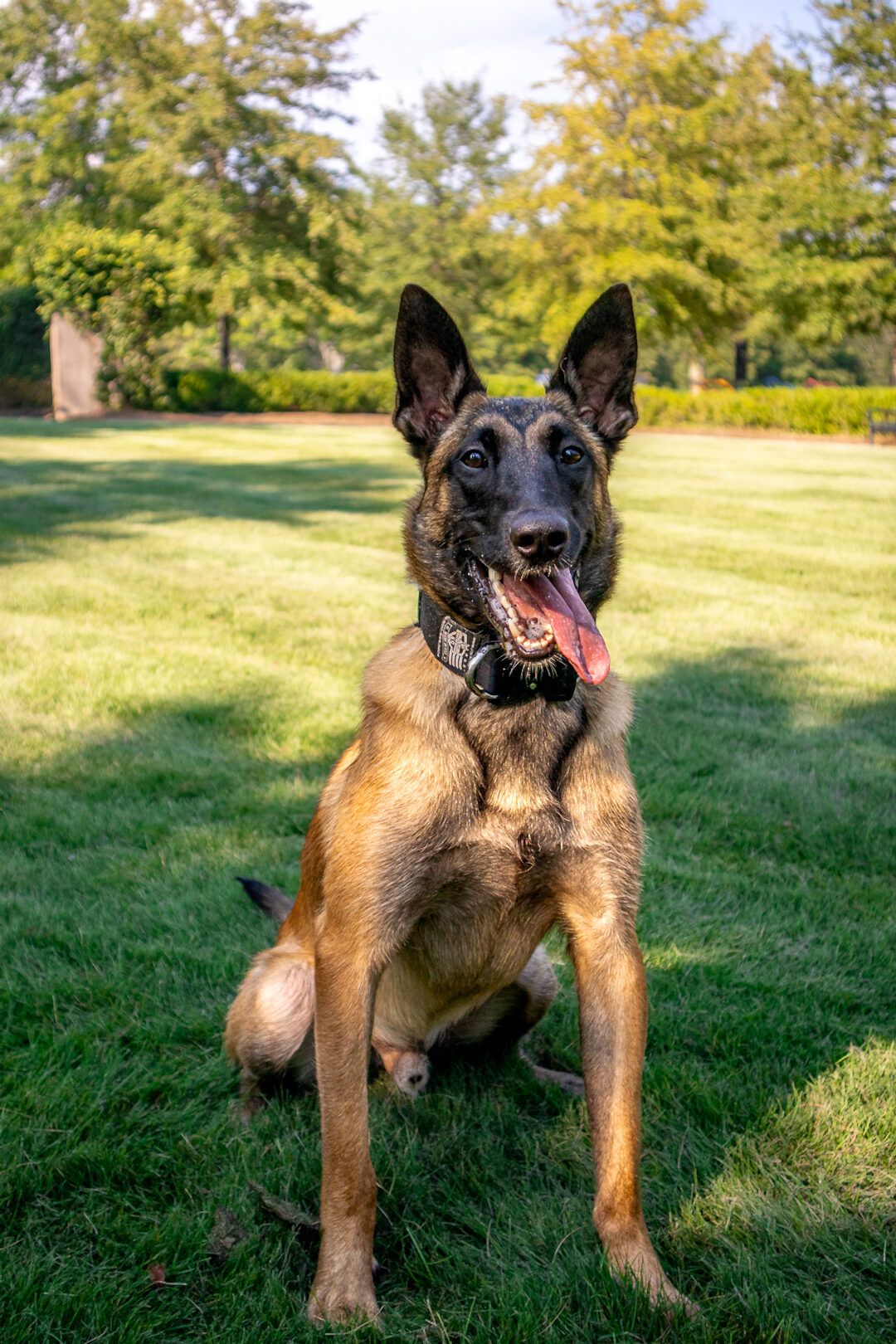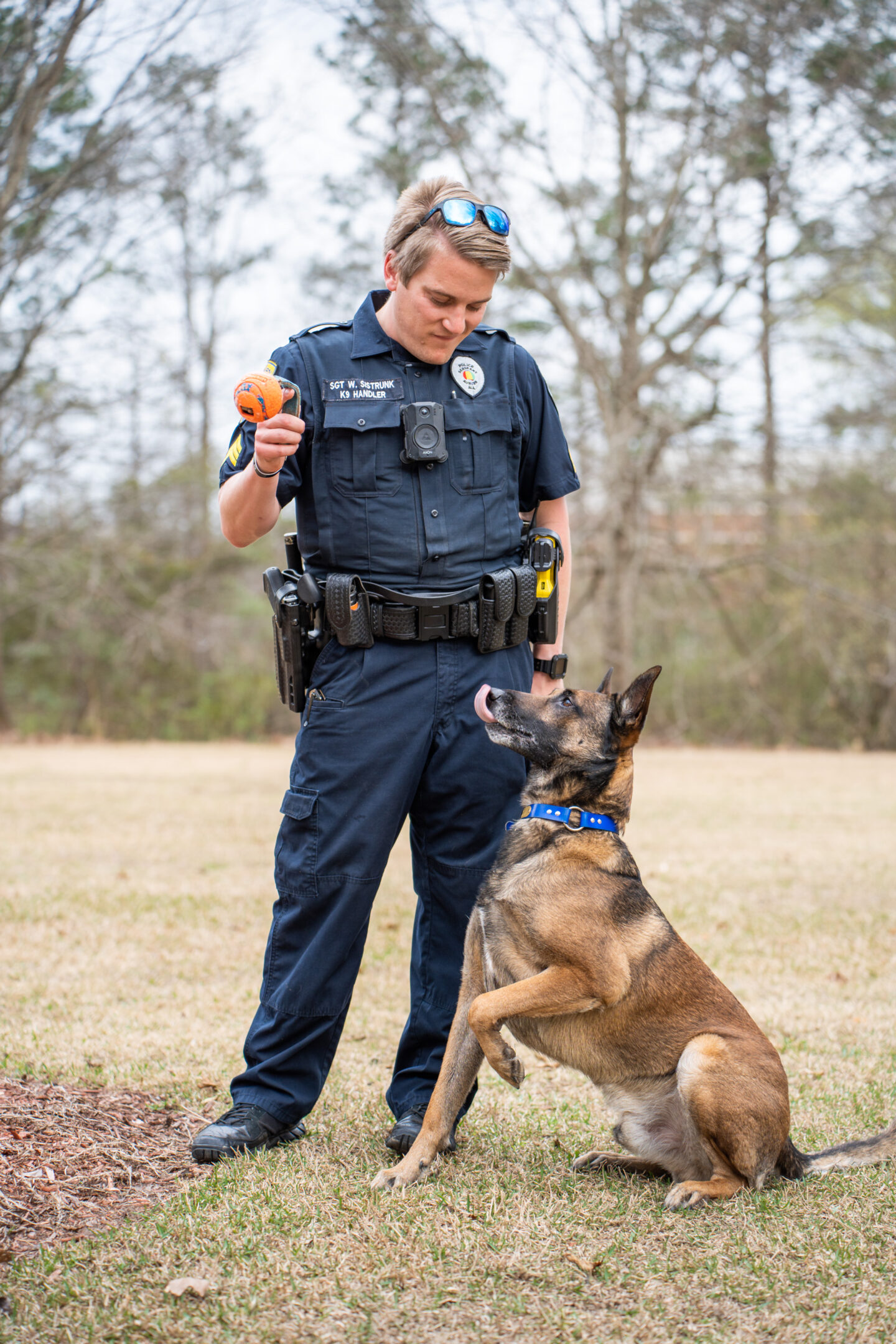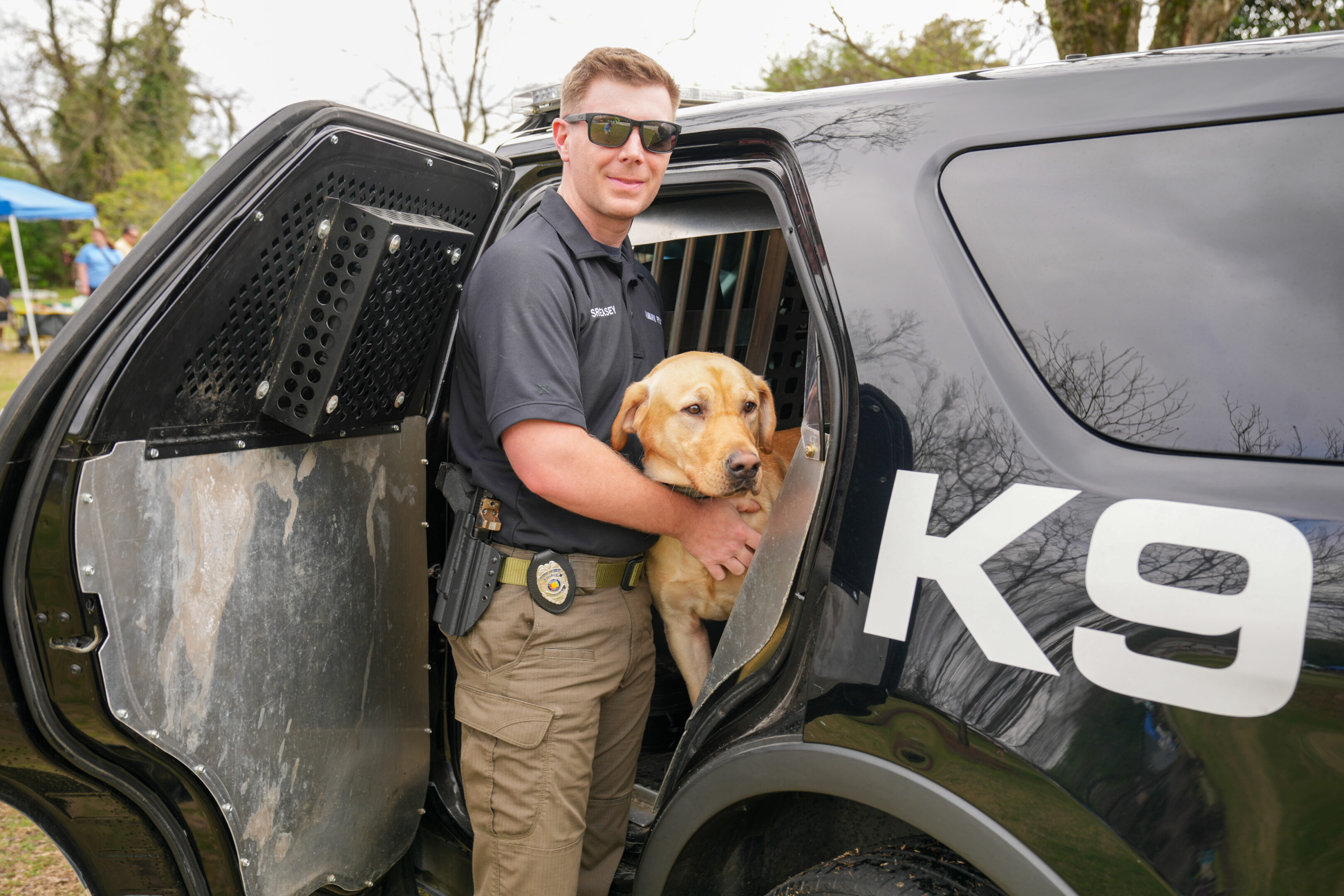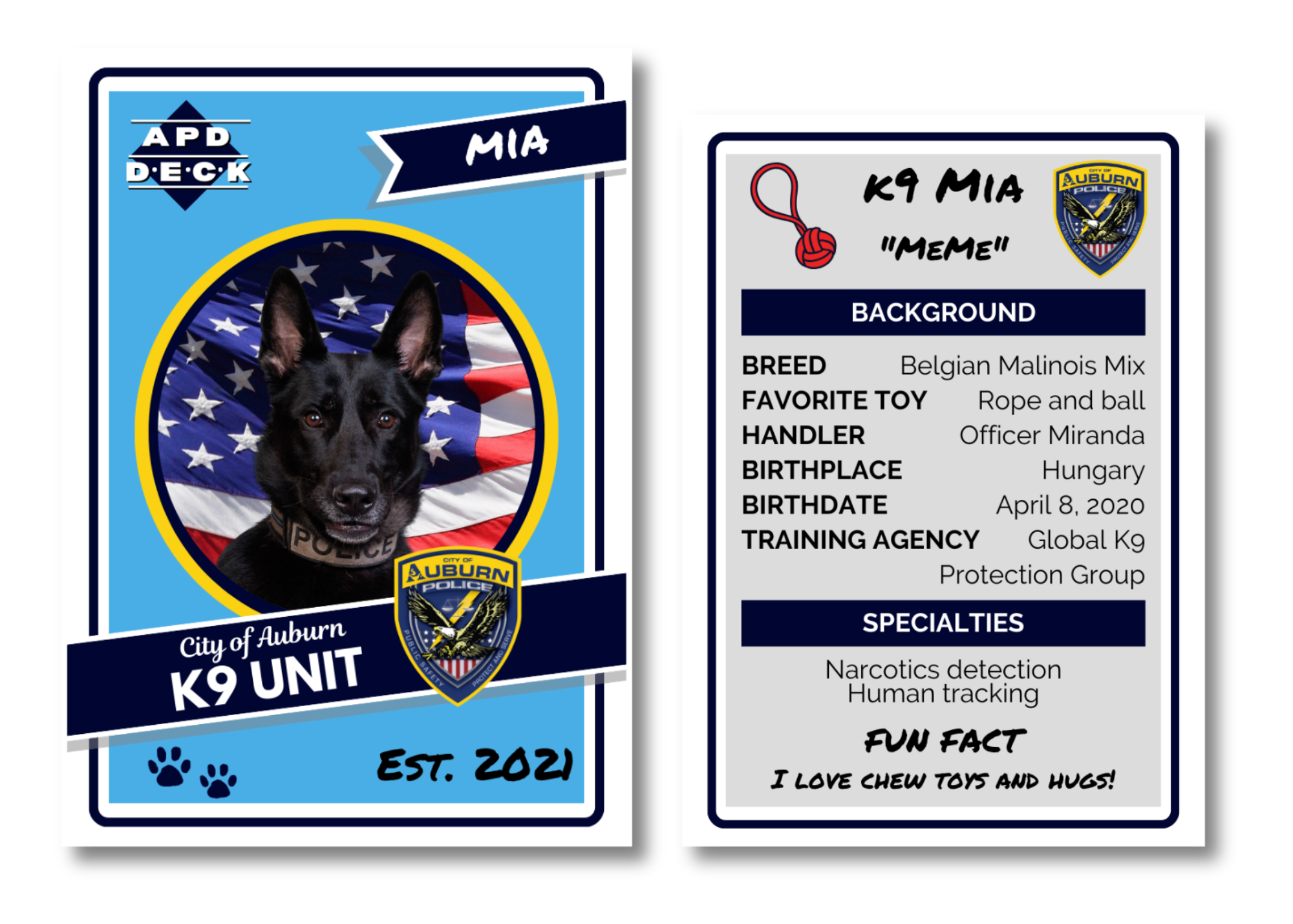.jpg)
Auburn's finest sniffers: A look into what it takes to become an APD K9
From parades and Auburn football gamedays to missing person searches and bomb threats, the Auburn Police Department's K9s play a huge role in protecting the Auburn community.
On game days at Jordan-Hare Stadium, an elite team of Auburn Police officers can smell you coming from a mile away.

Game days require hundreds of law enforcement officers to keep our community and visitors safe — both on campus and around the community. Among those ranks are a team of trained sniffers that are key to ensuring kickoff goes off without a hitch.
Ikia, Jet, Kenzie, Leon, Max, Mia, Spectrum and Underdog report to work just like their handlers. And, just like their handlers, they go through intensive training before they can report for duty. Ranging from nine years of service to just a few months on the job, the Auburn Police Department’s K9s are one of the most valuable tools our officers have.
“There's no technology out there right now that will replicate a dog's nose,” said Lt. James Perry, the department’s senior K9 handler.
If you want to understand the ability of a dog’s nose, Perry has two words for you: beef stew.
While you might be able to identify your grandma’s stew simply by the smell, a K9 can tell you how much salt is in it, what kind of beef was used, whether it includes carrots or potatoes — they’re true experts. While they have a keen natural ability, training is an essential and ongoing requirement for K9s and their handlers.
Training, training and more training.
Most of our K9s come to the job with their innate smelling-skills honed to detect and react a certain way to certain odors. The department’s four narcotics K9s are trained to locate about eight odors — such as marijuana, cocaine, heroin and fentanyl — and double as search and rescue dogs that help locate missing people or suspects on the run. The other four K9s are trained to identify around 15 different odors related to explosives.
While our narcotics K9s came from different kennels across the Southeast, the department’s explosives K9s were all bred and trained through Auburn University’s Canine Performance Sciences program.
That relationship also opened the door for the Auburn Police Department and Canine Performance Sciences to partner on research, training and certification efforts. A few years ago, that included training the narcotics K9s to detect fentanyl when the drug became more prevalent. On the explosives side, our K9s have participated in research to increase their ability to recognize odors that are harder to detect, such as explosives in airtight containers or trace amounts of substances that might usually go undetected.
Regardless of the K9’s specialty, training is a constant. While they never lose their sense of smell, they need practice to keep their skills up.
They train as a unit at least every other week, and most handlers do additional one-on-one training with their K9s — all to ensure they’re prepared when they’re called upon. Sgt. Webb Sistrunk, the lead K9 narcotics handler, has worked with his K9 Leon, a Belgian Malinois, for five years. The pair haven’t stopped training since day one.
Building a bond.

When a K9 and their handler are first paired up, they can quickly form a bond, but it takes six months to a year to “polish” their ability to work as a team, Sistrunk said.
“For the first few months, you question whether your dog is going to get things right,” Sistrunk remembered. “Sometimes that’s on the K9, and sometimes that’s because of the handler’s behavior. But now, after years together, we know what each other are thinking.”
“While the dogs come with training, detecting odors is just the bare basics,” said Perry, who has worked with his K9 Ikia, a Deutsch Drahthaar and Labrador mix, for nine years. “There’s so much more to learn about working with another living, breathing animal. It takes time to really build that relationship and understanding.”
That relationship is built 24/7 — handlers and their K9s are together around the clock. The dog becomes a part of its handler’s family, but they don’t get treated as pets.
“I’ve always tried to make the work more fun than home because I want Leon to be excited about going to work,” Sistrunk said. “I have to be careful about saying the ‘w’ word at home, because as soon as I say it, Leon lights up and is ready to go.”
Perry has two non-working dogs at home, but there’s a strong distinction between his relationship with Ikia and his pets. Ikia isn’t part of their pack.
“She understands that her place is with dad,” he said, adding that Ikia isn’t allowed on furniture and doesn’t get table scraps, either.
Focused on the mission.
This level of discipline and delineation keeps K9s focused on the task at hand. On a recent call, Leon was searching for narcotics in a cluttered house with food everywhere. Because of the years of work he’s put in, he “just didn’t care about it,” Sistrunk said. “He knew what the mission was.”
That drive equips our K9s to serve when they’re most needed, regardless of their surroundings. On a typical day, a narcotics K9 may assist with searching a vehicle during a traffic stop or be sent on a search for a robbery suspect. They’ve helped find elderly people with dementia and even located a child that went missing at school and was hiding in the bushes
The department’s explosives K9s regularly work large-scale events and respond to bomb threats, sweeping venues and buildings to search for potential threats. They’ve assisted with inaugurations of governors, presidential visits, City events, parades and of course, Auburn University sporting events.

Around 15 K9s work each Auburn University home football game, arriving at least five hours before kickoff to clear the venue. Along with the department’s eight K9s, we bring in other agencies to support game day public safety efforts. This year, K9s with the Lee County Sherrif’s Office, Enterprise Police Department and Global K9 Solutions out of Opelika will be among those protecting Jordan-Hare Stadium.
The dogs screen every contractor and vehicle that enters the stadium and conduct constant sweeps to make sure nothing is awry. K9s also patrol outside of the stadium, sniffing for any person-borne or vehicle-borne threats.
The same goes for downtown parades and community events. While these events are opportunities to connect and educate, the K9 unit is there to work. Their number one priority is always ensuring the safety of everyone at an event. Just like football games, K9s arrive at the event long before it begins, allowing them to sweep the streets and the event area to secure it before crowds arrive.
Thanks to generous gifts from the community, the Auburn Police Department has been able to expand the K9 unit in recent years. In 2022, we stationed two K9s at Auburn High School and Auburn Junior High School full time. When the students are there, so are Jet and Underdog protecting them from potential risks.

Along with keeping us safe at home, our K9s have gained a good reputation across the region and are called on by state, federal and local law enforcement agencies and partners to assist with public safety efforts. Our K9 unit has also served as a resource for other agencies looking to establish K9 programs. But first and foremost, our eight K9s are dedicating to serving the Auburn community just like their human partners.
So, next time you see one of our K9s out and about, thank them for their service! Make sure to ask the handler before reaching out to pet one of the dogs, though. Some K9s may not be up for a pat between the ears, but you can always ask handlers for their K9’s trading card that features the dog’s photo and info about its age, breed, favorite toy and more.
